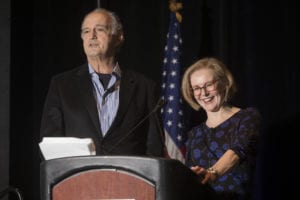Who is a member?
Our members are the local governments of Massachusetts and their elected and appointed leadership.

Jim Braude (left) and Margery Eagan, hosts of “Boston Public Radio” on WGBH, entertain with some tales about city councillor life at Braude’s expense during the Annual Meeting closing session.
Jim Braude and Margery Eagan of Boston Public Radio presided over a lively closing session at the MMA Annual Meeting on Jan. 19, featuring their trademark banter and good-nature ribbing along with the strong debate and probing questions that their radio show is known for.
Joining Braude and Eagan for a “live” radio broadcast, with the audience making “calls” into the show, were former Public Safety Secretary Andrea Cabral and Lawrence Mayor Dan Rivera, who stepped in for Acting Gov. Jane Swift, who was unable to attend.
The radio duo opened with Eagan teasing Braude about his single term as a Cambridge city councillor, including the assertion that Braude coerced a 90-year-old woman to chain herself to a tree that he was trying to save.
“The truth is, she was 82,” Braude retorted, “and she wanted to chain herself.”
On a serious note, Braude said his two years as a local official, after a career as a lobbyist and advocate “yelling at public officials,” changed his perspective on public service.
“I would argue that a huge part of the reason why I’m pretty decent at what I do is because of the experience I had,” he said. “And when the federal government is not doing things it should do and doing tons of things it shouldn’t do, it makes the role of what I used to do – and what you do every single day – even that much more important.”
Eagan added that she began her career covering local government for the Fall River Herald News, reporting about the towns of Dighton, Somerset and Swansea and boards such as the Westport Second Lagoon Commission and zoning boards of appeals. She contrasted that coverage with the limited resources in journalism today.
“When reporters used to be at all these meetings, the good guys in government would be able to get credit for what they were doing and do good things, and the bad guys, it would be harder for them to cheat in the zoning board of appeals,” she said. “I do think there needs to be some way going forward to keep watchdogs in small town government. Because as Jim said, what selectmen and zoning boards and conservation commissions do is so, so important.”
After a debate with Cabral and Rivera about the federal government shutdown, the panel moved on to more local issues – namely, the rollout of adult-use recreational marijuana.
Braude asked Cabral if the Legislature kept falling behind public opinion on marijuana out of fear, pointing to voter-backed ballot initiatives to decriminalize in 2008, to legalize medical marijuana in 2012, and then to legalize adult recreational use in 2016.
Cabral, now the chief executive of Ascend Cannabis, said that in politics, officials hear much more often from the people who disagree with them and keep the pressure on in their lobbying efforts. Even as a Suffolk County prosecutor, she added, she felt that marijuana should not have been a federally scheduled drug.
“To schedule a drug, the Drug Enforcement Agency is saying the drug has no therapeutic or medicinal value whatsoever,” Cabral said. “People are now realizing the degree to which it helps them medically, and I wonder if we might not have as big a Big Pharma if people could have been growing medicine in their backyard all this time.”
On the other side of the debate, Rivera explained why Lawrence supports banning recreational marijuana facilities in the city, saying that “the church is a big part” of Lawrence families’ lives and that children in his city are “looking for a way out of life.”
He recalled that when the ballot question passed in 2016, at 10 a.m. a car full of teens smoking marijuana rolled down the window and called out to him in excitement about the legalization.
“I know that there’s a place, because I was one of those kids in Lawrence, where I’m looking to escape the reality,” he said. “There’s already too many venues for that.”